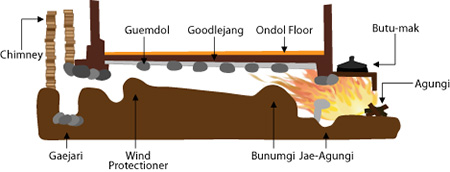


さて韓国・河回村の住文化を日本と対比させながら掘り下げています。
住宅にはさまざまな要素が込められるのでこれまでは主に民俗の違いを見た。
まずは水田耕作主体で土木技術発展と生産管理技術が進化した日本と、
気候的に乾燥気候であり陸稲主体で水田づくりが進まなかった朝鮮半島の違いを見た。
このことは同時に封建主義が完全に根付いて一所懸命思想が行き渡った日本と
土地効率利用がそれほど進まず王権への忠勤競争の朝鮮という相違を生んだ。
また日本は階級循環が活発な社会で身分制固定的な儒教が根付かないのに対して
中国大陸に近い朝鮮は事大主義的な傾向を持つのではないかと推論した。
どっちかといえば社会規範からの住宅、暮らし方の部分ですね。
で、北海道人としてはより根源的な興味、暖房についてであります。
生活文化の規定性については上記のような発展の相違があったけれど、
一方で「あたたかさ」という住宅性能の面では日本は遅れていた。
日本人である北海道人としてどうしても日本住文化でわからないのが、
なぜ日本は「あたたかい家」という志向性を実現できなかったのかという点。
朝鮮民族にはすばらしい叡智「オンドル」が輝かしい存在としてある。
冷涼乾燥気候の朝鮮半島では住宅へのオンドル設置は常識であった。
台所などの竈で煮炊きしたときに発生する煙を居住空間の床下に通し、
床を暖めることによって部屋全体をも暖める設備。火災の危険を避けるため
オンドルを備えた家の土台はすべてクドゥルジャンという板石を用いて築き、
部屋の床は石板の上を漆喰で塗り固め、その上に油をしみこませた厚紙を貼る。
朝鮮半島においては紀元後7世紀までの三国時代から使用の痕跡が見られ、
飛鳥時代日本に渡来の高句麗や百済出身者もオンドルを備えた家に住んでいた。
しかしこの暖房方法は燃料の消費量が多くまた高湿度地域には向かないことから
日本では普及しないまま、土着するとともに廃れてしまった。
薪を燃料として大量に使うオンドルは森林破壊の元凶となったのだ。
このあたり省エネの視点で見ればエコな日本といえるのか。
国交省などの行政施策方針を見ると「もともと日本はエネルギー消費少ないし」
という民族的ホンネが随所に影響していると思う。
また木にリスペクトする神社という独自の宗教精神性も与っているのだろうか。
このことは前述の水田耕作主体の社会発展ということと関係があるか。
水田でのイネの生育には温暖気候が不可欠であり、
その気候条件を満たさない北海道島にはながく開発の食指が動かなかった。
民族傾向から活動の低下する冬期は「耐え忍ぶ」生き方だった。
オンドルの設置使用で朝鮮民族の生活様式はさまざまな影響を受け変革された。
竈の火で床下を暖める構造上、2階以上の床下を暖めることはできない。
そのため朝鮮半島では平屋建築が主流となった。床下に煙が流れ込みやすいよう、
竈がある釜屋(プオク・台所)は居室より低い半地下式に作られ台所の天井裏には
高低差を生かして「タラク」という納戸が設けられた。
オンドルで温められる部屋は焚口=台所に近い場所ほど暖かいため上座とされた。
また床のぬくもりが人体に伝わりやすいように蒲団や座布団は薄く作られた。
いま、日本民族は独自工法の在来木造工法の高断熱高気密化を実現した。
ただ温暖地域の生活文化は変化へのかなりの抵抗勢力なので、
どうこの進化が推移していくか、興味深い段階にいると言えるでしょうね。
English version⬇
[Hanok’s performance advantage “Ondol floor heating” Reminiscences of Andong Hahoe Village, South Korea-9]
Now, I’m delving into the living culture of Andong Hahoe Village in South Korea while comparing it with Japan.
Since there are various elements in a house, I have mainly seen folk differences so far.
First of all, Japan, where civil engineering technology development and production control technology have evolved mainly through paddy cultivation,
We saw the difference between the Korean Peninsula, which has a dry climate and has not been developed mainly by upland rice.
At the same time, this is with Japan, where feudalism has taken root completely and ideas have spread hard.
Land efficiency utilization did not progress so much, making a difference between Korea and Korea, which competes for loyalty to the kingship.
Also, while Japan is a society with active class circulation, Confucianism with a fixed social division does not take root.
It was inferred that Korea, which is close to mainland China, may have a sadaejuui tendency.
If anything, it’s the part of housing and living style from social norms.
So, as a Hokkaido person, I have a more fundamental interest in heating.
Regarding the regularity of life culture, although there were differences in development as described above,
On the other hand, Japan was behind in terms of housing performance called “warmth.”
As a Japanese Hokkaido person, what I really don’t understand about Japanese living culture is
The point is why Japan could not realize the intention of being a “warm house”.
The wonderful wisdom “Ondol” is a brilliant existence in the Korean people.
Ondol installation in houses was common sense on the Korean Peninsula, which has a cool and dry climate.
Smoke generated when cooking in a kitchen or the like is passed under the floor of the living space,
Equipment that warms the entire room by warming the floor. To avoid the danger of fire
The foundation of the house with ondol was all laid using a stone slab called Kudurjan.
The floor of the room is plastered on a stone board, and oil-impregnated cardboard is pasted on it.
On the Korean Peninsula, traces of use have been seen since the Three Kingdoms period until the 7th century AD.
People from Goguryeo and Baekje who came to Japan during the Asuka period also lived in houses equipped with ondol.
However, this heating method consumes a lot of fuel and is not suitable for high humidity areas.
It became indigenous and obsolete without becoming widespread in Japan.
Ondol, which uses a large amount of firewood as fuel, was the cause of deforestation.
From the perspective of energy conservation, can we say that Japan is eco-friendly?
Looking at the administrative policy policies of the Ministry of Land, Infrastructure, Transport and Tourism, “Japan originally consumes less energy.”
I think that the ethnic honesty is affecting everywhere.
Also, does it have the unique religious spirit of a shrine that respects trees?
Is this related to the above-mentioned social development of paddy field cultivation?
A warm climate is indispensable for the growth of rice in paddy fields,
The index finger of development did not move for a long time on Hokkaido Island, which does not meet the climatic conditions.
In winter, when activity declined due to ethnic tendencies, it was a way of life that “endured.”
The installation and use of ondol changed the lifestyle of the Korean people under various influences.
Due to the structure that warms the underfloor with the fire of the Kamado, it is not possible to warm the underfloor on the second floor and above.
Therefore, one-story architecture became the mainstream on the Korean Peninsula. To make it easier for smoke to flow under the floor
The Kamaya (Puoku kitchen) with a kamado is built in a semi-underground style, which is lower than the living room, and is located behind the ceiling of the kitchen.
Taking advantage of the height difference, a storage room called “Taraku” was set up.
The room that can be heated with ondol is the upper seat because it is warmer as it is closer to the fire mouth = kitchen.
In addition, the quilts and cushions were made thin so that the warmth of the floor could be easily transmitted to the human body.
Now, the Japanese people have realized high heat insulation and high airtightness of the conventional wooden construction method, which is an original construction method.
However, the living culture of warm regions is a considerable resistance to change, so
It can be said that we are at an interesting stage as to how this evolution will progress.
Posted on 8月 27th, 2021 by 三木 奎吾
Filed under: 住宅マーケティング, 住宅性能・設備







コメントを投稿
「※誹謗中傷や、悪意のある書き込み、営利目的などのコメントを防ぐために、投稿された全てのコメントは一時的に保留されますのでご了承ください。」
You must be logged in to post a comment.